NHRC, India organises National Conference on the ‘Rights of Transgender Persons’ in New Delhi
NHRC, India organises National Conference on the ‘Rights of Transgender Persons’ in New Delhi
The National Human Rights Commission (NHRC), India today organised a day long National Conference on the ‘Rights of Transgender Persons: Revamping Spaces, Reclaiming Voices’ at India Habitat Centre in New Delhi. Chairperson, Justice Shri V. Ramasubramanian inaugurated in the presence of Shri Amit Yadav, Secretary, MoSJE, Shri Bharat Lal, Secretary General, NHRC, senior officers, representatives of key Ministries, experts, judicial and legal experts, policy makers, civil society organisations, UN agencies, law enforcement agencies, academicians and community leaders among various stakeholders.
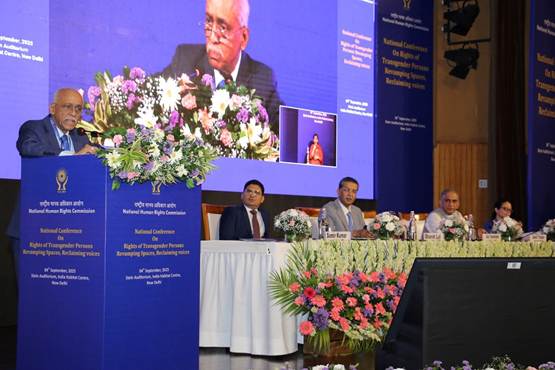
Invoking Isavasya and Chandokya Upanishads, Justice Ramasubramanian said that India is a country where discourse on equality was taken to such great heights by the Upanishads that every unit of creation is God’s manifestation. Therefore, he questioned how can some units of such creations be discriminated by others. He said that these are the pivotal questions around which the NHRC has organised this conference.
He said that if we have a look at the history of evolution of human rights in modern times, everything is in a binary. The mere change of terminology from ‘men’ to ‘human beings’ in the Universal Declaration of Human Rights (UDHR) in 1948 has not actually transformed our stereotypical thought processes and the society continues to think that men and women alone constitute the human race. There could be and there are human beings, who do not fit into this binary of men and women. This is something that the societies all over, are still grappling to accept. He said that the consequences of this is that Trans people experience wide spread discrimination and stigma in the health sector, schools, employment and housing as well as in accessing washrooms.
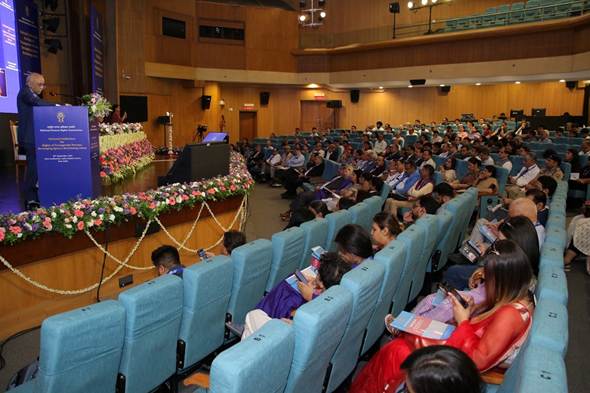
Justice Ramasubramanian said that fortunately, India is far ahead of several other countries in recognising the rights of Trans persons with the legislative, executive and the judiciary coming together to transform the philosophy of Upanishads into a Constitutional Theme and then to translate the same into a court order followed by a Parliamentary law in the shape of the Transgender Person (Protection of Rights Act, 2019). However, the constitutionality of Sections 4, 5, 6, 7, 12(3), 18(a) and 18(d) are currently under challenge before the Supreme Court of India. It is in this context that the NHRC is privileged to host this National Conference as a segment of our population estimated as per the 2011 census, to be around 4.88 lakh cannot be left out of the mainstream.
Before this, Shri Amit Yadav, Secretary, Ministry of Social Justice and Empowerment (MoSJE), in his special address said that in line with the guiding principles in Article 14, 15 and 16 of the Constitution, the Government is committed to ensure that nobody, including the Transgender persons, is discriminated against. The 2019 Act, enacted post Supreme Court orders, talks about every aspect of their welfare including health, education etc. We have to ensure that the provisions of this Act are translated into action. The setting up of National Council for Transgender Persons, SMILE scheme for Garima Grehs, National Portal for Transgender persons are some of the proactive measures taken by the government towards the welfare of Transgender persons. He said that the improvement and revision of guidelines based on feedback is always a work in progress. Based on the feedback, the Government in 2025 changed the guidelines for the Garima Grehs. For health care also the Government is issuing Transgender Ayush Cards and so far 50 cards have been issued. To expedite this process, he said that the transgender persons need to identify and register themselves on the National Portal. He said that the NHRC, SHRCs, others institutions and civil society can make an important contribution in building awareness about this.
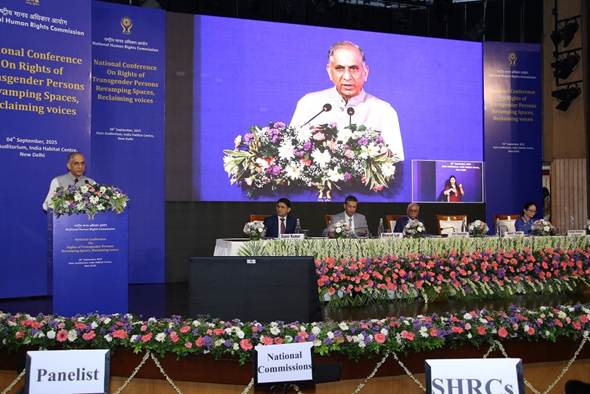
Shri Yadav said that the Government has also started skill and vocational training for them to ensure their employment as per the 2019 Act provisions and the first batch of trained transgender persons is about to complete this training. The Government is also organising Rozgar melas for the Transgender persons. More partnership with private sector is needed for this purpose. The Government is further working on revising their welfare schemes and it is looking forward to suggestions and funds are not a challenge. Their grievance redressal mechanism will be strengthened in the coming months. He said that the MoSJE is also working with the Department of Education to sensitise children about the issues of Transgender persons and build awareness in an effort to collectively work towards their rights for equal opportunity, dignity and inclusivity. Such conferences and forums as organised by the NHRC, India are very important for this purpose.
Earlier, Shri Bharat Lal, Secretary General, NHRC said that human dignity is indivisible and the true measure of the society lies in how it treats its most marginalised and vulnerable communities. He highlighted that in ancient and medieval India, transgender persons were held in high esteem, without any discrimination. Unfortunately, Criminal Tribes Act, 1871 classified the community as a ‘criminal tribe’. An enlightened India after independence, repealed the Criminal Tribes Act in 1952. Also Section 377 of the erstwhile IPC criminalised ‘non hetero–normative sexual behaviour’, which has become a part of our history.
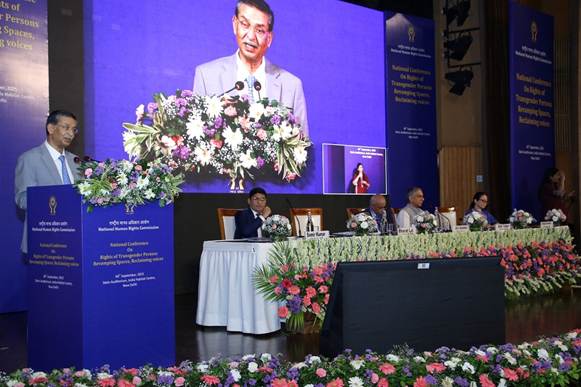
He said that according to the 2011 Census, approximately 4.88 lakh individuals identified themselves as transgender persons. This is just 0.04% of India’s population. Yet behind these numbers lies a stark reality: a literacy rate of only 56.07% among transgender persons, significantly lower than the national average; limited access to formal employment; and widespread barriers in accessing supportive, gender-affirming healthcare. He said that documentation too remains a major hurdle. Non-availability of ‘gender identity certificates’ continues to block access to welfare schemes, financial services and justice. He said that we must support Transgender children with care, not rejection; ensure dignity and care for elderly Transgender persons; make law enforcement protective allies, not threats; and open up employment opportunities to uphold dignity through independence.
However, Shri Lal also noted that in the last decade, tremendous progress has been made since 2012 the Ministry of Social Justice and Empowerment began working on Transgender issues. He emphasised that for the NHRC, protection and promotion of most vulnerable and marginalised sections of society and their dignity is the top most priority. In 2001-02, NHRC recommended review of Section 377 of then IPC and NDPS Act. In 2018, NHRC constituted Core Group on LGBT issues and the Transgender community has been the focus. In 2020, during Covid–19 pandemic, the Commission issued an Advisory protecting LGBTQ+ community. On 15th September, 2023, the Commission issued an Advisory for ensuring the welfare of Transgender persons. He said that in 2024-25, NHRC team visited 12 Garima Greh Shelters established in the first phase to gather ground level insights and develop evidence–based future course of actions. The findings have been compiled in the form of a report —Transgender Persons: Revamping Spaces, Reclaiming Voices – Insights from Garima Greh Shelters and Beyond. This report was released on the occasion.
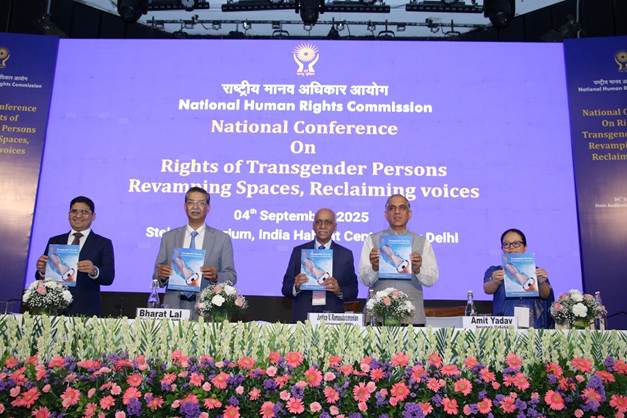
Shri Samir Kumar, Joint Secretary, NHRC gave an overview of the Conference and Smt. Saidingpuii Chhakchhuak, Joint Secretary, NHRC delivered the vote of thanks in the inaugural session.
Based on the findings of the Commission’s team, the report emphasises on strengthening of the Garima Greh initiative besides suggesting several key reforms. All states should activate Project Monitoring Committees (PMCs), with clear delegation of responsibilities to district officials and appointment of police focal points for transgender issues. Timely release of funds must be ensured, along with revised allocations for food and beneficiaries, context-specific financial models for urban and rural shelters and infrastructure support through one-time grants. Staffing structures should align with market standards, with rationalised roles to prevent overburdening. Shelter heads must be empowered to assist with transgender ID card issuance through simplified, privacy-sensitive processes. In healthcare, broader medical expenses should be covered, hospital partnerships established and the rollout of Ayushman Bharat TG Plus expedited, alongside stronger mental health and HIV/AIDS services.
The report also recommends employment and skill development, shelter stay should be extended for those pursuing education or exams, vocational training access expanded and shelters linked with job portals, while ensuring workplace protection under the POSH Act. Legal amendments are needed to support gender non-conforming minors, with the establishment of child care and elderly homes for Transgender persons, supported by NGOs. Greater transparency through updated data, strong monitoring and a dedicated ministry desk is essential. These reforms can transform Garima Greh into a foundation for dignity, empowerment and inclusion.
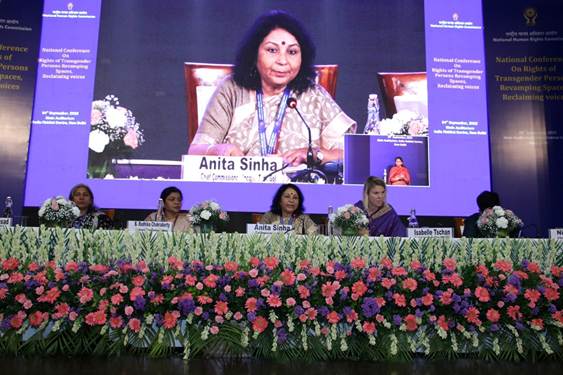
Apart from the inaugural and valedictory sessions, the conference was divided into three technical sessions and a panel discussion. The first session on ‘Strengthening Garima Greh Shelters’ was chaired by Smt. Anita Sinha, Chief Commissioner, Income Tax Department. The panelists were Smt. B. Radhika Chakraborty, Joint Secretary, National Commission for Women, Ms. Isabelle Tschan, Deputy Resident Representative, UNDP, India, Ms. Reshma Prasad, Dostana Safar, Patna and Shri Nikunj Jain, Co-Director, Tapish Foundation, Garima Greh. Second session on ‘Institutional Care for Gender Non Conforming Children & Elderly Transgender Persons’ was chaired by Dr. D.M. Mulay, Former Member, NHRC. The panelists were Smt. Tripti Guha, Additional Secretary, MWCD & Chairperson, NCPCR, Ms. Laxmi Narayan Tripathi, NHRC Special Monitor & Core Group Member, Ms. Abhina Aher, Managing Director, Tweet Foundation and Shri Gopi Shankar Madurai, Intersex and Genderqueer activist, Founder, Srishti Madurai. The third session on ‘Building a Fair and Inclusive Law Enforcement Framework’ was chaired by Smt. Jyotika Kalra, Former Member, NHRC with participation from Ms. Shalini Singh, IPS, Director General of Police, Puducherry, Sh. Ram Dulesh, Dy. Commissioner Police, Delhi, Ms. Kalki Subramaniam, Founder, Sahodari Foundation and Ms. Shreegauri Sawant, Transgender Rights Activist.
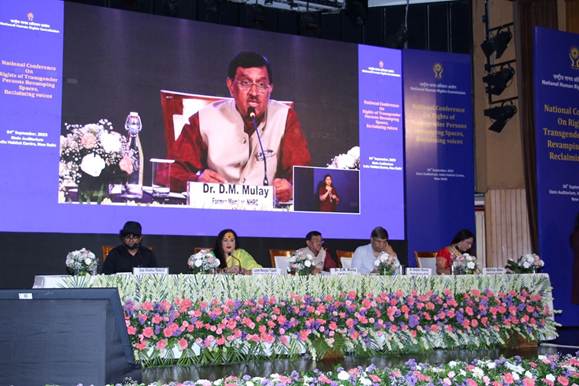
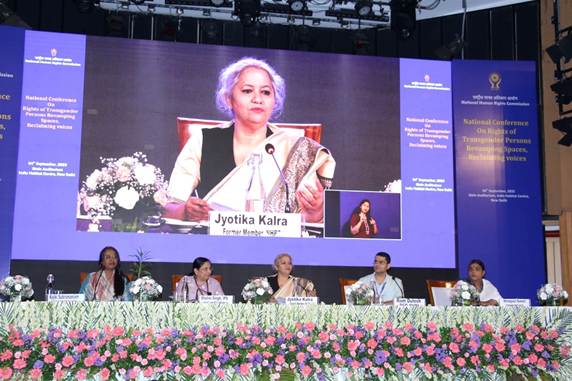
After this, a panel discussion on ‘Unlocking Employment, Defying Challenges – Stories of Triumphs’ was chaired by Shri Bharat Lal, Secretary General, NHRC along with participation from Smt. Latha Ganpathy, Joint Secretary, Ministry of Social Justice and Empowerment, Ms. Zainab Patel, Managing Director, Pride Business Network Foundation and Ms. Nishtha Nishant, Manager, Diversity, Equity and Inclusion, Lalit Suri Hospitality Group, Stories of triumphs were shared by Shri Ronit Jha, Sub Inspector, Bihar, Shri Bunty Kumar, Sub Inspector, Bihar and Dr. Beoncy Laishram, Manipur.
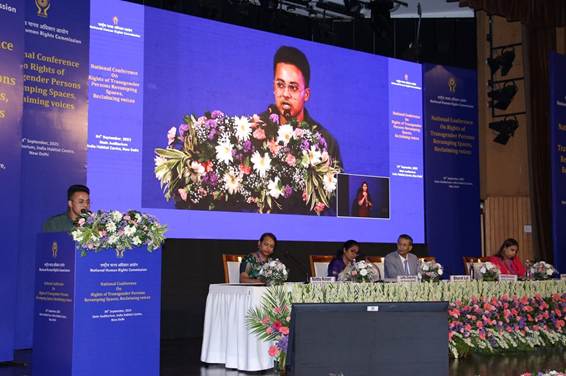
In the Valedictory Session, Shri Bharat Lal, Secretary General, while summing up the discussions said that in every session panelists from the Transgender community brought to light the fact that among various marginalised groups, Transgender persons remain the most vulnerable. He stressed the need for concerted efforts, greater investment in education, improved access to healthcare and the creation of more opportunities for their inclusion. While many states have initiated inclusive measures, there is still much room for improvement. He emphasised that the transgender community, civil society and government must work together to uphold constitutional values and achieve true equality, reminding all that dignity must be extended to everyone. He concluded by noting that while progress has been made, significant work still lies ahead.
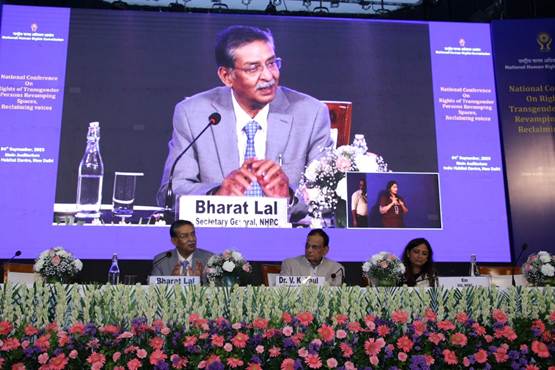
Dr. V.K. Paul, Member, NITI Aayog, in his way forward address thanked the NHRC for its outreach and acknowledged the importance of the issue. Referring to the NHRC’s report, he praised its coverage of gender non-conforming children, best practices in employment and workplace inclusion. He stressed that awareness must be raised to reinforce the idea that society is one and humanity is indivisible. He further underlined that India must lead the way on Transgender rights, as they are deeply rooted in Indian values. He called for scaling up efforts across all sectors of society, adopting systematic approaches to address gender-related challenges in workplaces and assured that NITI Aayog stands ready to collaborate with the NHRC for any policy interventions and guide in advancing the cause of Transgender persons. Smt. Kim, DIG, NHRC delivered the vote of thanks.